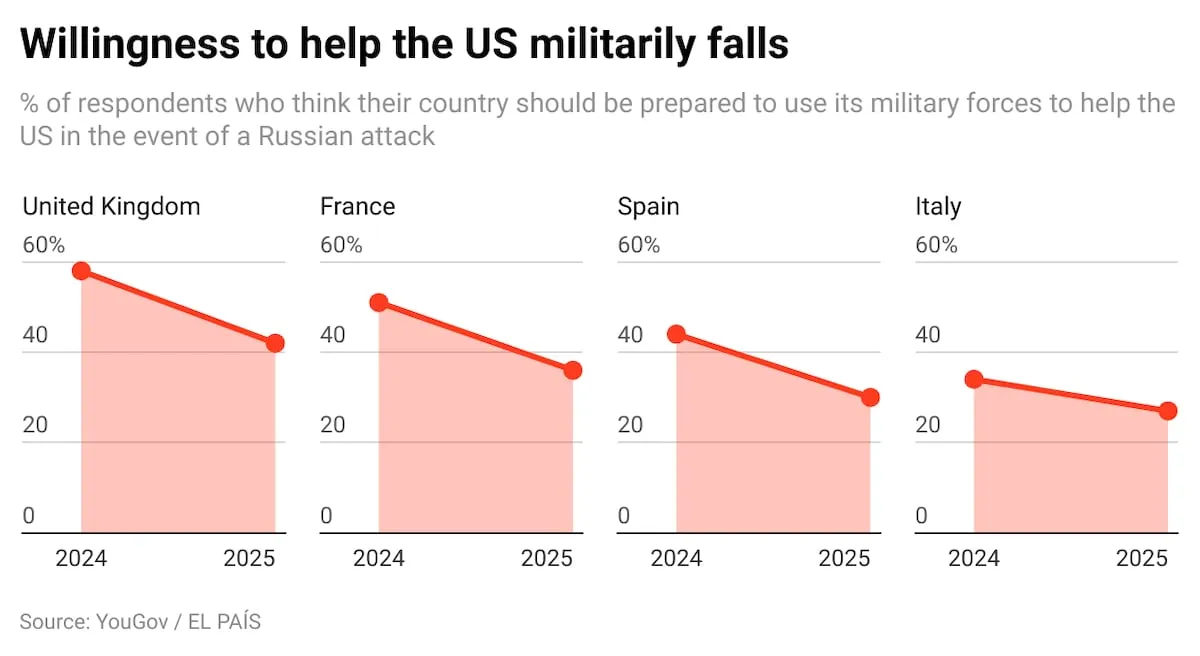
Former President Donald Trump’s return to the White House has significantly disrupted the global geopolitical and financial landscape. His unpredictable and often chaotic style of governance has transformed the United States into a primary factor destabilizing international markets and diplomatic relations. The resulting unpredictability has negatively impacted his approval ratings among the population. As Trump approaches the milestone of his first 100 days in office on Wednesday, various charts highlight the turbulence caused by his erratic decisions.
The global economy experienced intense tension the moment Trump initiated an erratic trade war, imposing indiscriminate tariffs on both allies and adversaries, only to later suspend some of them. The S&P 500, which tracks the performance of the largest companies in the United States, has seen a 9% decline since Trump returned to power on January 20. Particularly notable was April 8, when the tariffs took effect, leading to an 18% drop in the index. Despite this initial shock, some markets, such as Spain’s Ibex 35, have rebounded, rising by 11% since the change in presidency. Under market pressure, Trump temporarily agreed to pause tariffs—excluding those targeting China—for 90 days. Market volatility has since been influenced by comments or posts on social media; a protectionist remark from Trump or his team can trigger a market drop, while a conciliatory statement can lead to a rebound.
When comparing the start of Trump's presidency to previous administrations, the data is alarming. The S&P 500's performance during the first 94 days of Trump's term shows a 9.3% drop, marking the worst start for at least the last 14 presidencies. This performance outstrips Gerald Ford’s rise to power in 1974, following Richard Nixon's Watergate resignation (-8.9%), and is worse than George W. Bush’s presidency, which began amidst the dot-com crisis (-8.5%).
The Federal Reserve Bank of Atlanta, using a model that provides real-time estimates of economic growth, has already reflected the negative impacts of the trade war, estimating that U.S. GDP contracted at an annualized quarterly rate of 2.8% in the first quarter. By early April, the estimate dropped even further to 3.7%, marking the worst figure since the COVID-19 pandemic. Recently, the forecast has been moderated to a 2.2% decline. According to Polymarket, a prediction community, the probability of the U.S. entering a recession before the end of the year stands at 55%. While this percentage indicates uncertainty, many observers cite a robust labor market, with an unemployment rate of just 4.2%, as a sign that a recession may be avoided. However, when the world's largest economy slows down, it can adversely affect other countries. This week, the International Monetary Fund (IMF) revised its U.S. GDP growth forecast down by 0.9 points to 1.8%, raising the odds of a recession to 37%. The global growth forecast for 2025 has also been downgraded from 3.3% to 2.8%.
The unpredictability associated with Trump’s administration has left little room for economic optimism among the American public. Currently, 52% of Americans believe the economy is worsening, a figure that has steadily increased since Trump's inauguration when it was below 40%.
Trump’s first quarter in office is also marked by a significant drop in his approval rating, which has fallen by 18 points since January 20. It is common for approval ratings to decline from inauguration to the end of a term; for instance, Biden's approval rating was 36 points lower than when he took office. However, in just 92 days, Trump's approval rating has plummeted nearly 24 points below Biden’s at the same point in their respective terms, even worsening compared to his own record from 2017, where he was five points higher.
Trump's return has soured relationships with traditional U.S. allies. In March, 64% of Canadians believed the U.S. is an enemy—up 14 points from February. This growing distrust is a result of tariffs, immigration policy pressures, and disputes over Arctic sovereignty. The shift in perception is stark; in the summer of 2020, nearly 70% of Canadians viewed the U.S. as a friendly nation. In Europe, multiple flashpoints involving NATO, the situation in Ukraine, tariffs, and trade tensions have further deteriorated the U.S.'s image, especially in Denmark, where Trump's comments about annexing Greenland have contributed to a negative perception.
In the United Kingdom, tariffs—specifically a 10% tariff—have strained what both countries once referred to as a “special relationship.” The uncertain economic outlook in London, characterized by a 0.5-point growth downgrade by the IMF, coincides with an 18-point decline in Trump's popularity among the British, marking the largest decrease in the past five years.
Trump’s administration has led to increased tensions within NATO, with top officials attacking European allies as “pathetic” and “freeloaders.” This rhetoric has fractured the Western geopolitical bloc unified around NATO. Trump's desire to revive U.S. relations with Russia has caused European nations—once seen as allies—to distance themselves from the U.S. The willingness of Britons to use military force to assist the U.S. against a hypothetical Russian attack has plummeted from 58% to 42%.
In conclusion, Trump’s return to the presidency has not only disrupted the U.S. economy and stock markets but has also strained relationships with allies and weakened international alliances. As he approaches his first 100 days in office, the world watches closely, waiting to see how his policies will unfold in the coming months.